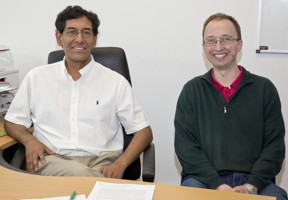Home > Press > Analogue quantum computation has been universally digitized using superconducting circuits: The University of the Basque Country and Google have colaborated on the experiment published in Nature
 |
| Enrique Solano and Lucas Lamata CREDIT: UPV/EHU |
Abstract:
The QUTIS group, led by the Ikerbasque professor Enrique Solano, is a world leader in theoretical proposals for quantum simulation and quantum computation with superconducting circuits and other quantum technologies, which are carried out and verified at major international scientific and technological labs. The American company Google has one of the most advanced labs in this field and is a world leader in this technology.
Analogue quantum computation has been universally digitized using superconducting circuits: The University of the Basque Country and Google have colaborated on the experiment published in Nature
Leioa, Bizkaia | Posted on June 13th, 2016The UPV/EHU team that conducted this work was led by Prof. Enrique Solano and Dr. Lucas Lamata. And the Google team was led by Prof. John Martinis, Dr. Hartmut Neven, Dr. Rami Barends and Dr. Alireza Shabani.
Digital quantum computation splits up the problem to be resolved in terms of quantum logic gates in a way similar to that of a conventional computer. Analogue quantum computation, by contrast, consists of a continuous dynamics to get to the optimal solution of the problem. This dynamics can be slow, as is the case of adiabatic quantum computing based on so-called quantum annealing. What is more, superconducting quantum bits are devices that behave efficiently at very low temperatures that are achieved in advanced laboratories. In this pioneering experiment superconducting quantum bits were used to digitize an analogue quantum computer in a way similar to what is done with communication signals in conventional technologies. To do this, the problem was split up into a sequence of quantum logic gates, and quantum computation with the greatest complexity so far was achieved: over 1,000 logic gates operating on 9 quantum bits. This strategy will enable optimization problems to be universally solvable; they are useful in fields as general as finance, and also in the design of new materials and products for the pharmaceutical industry.
This breakthrough has come at a key moment for Europe as Brussels is expected shortly to be announcing the investment it will be making over the coming years in quantum technology research and development. Countries such as the United States, Japan, China, Australia and Canada are already investing huge economic resources in these areas with a global strategic framework. Among other things, quantum technologies will enable computer performance to be improved, progress to be made in machine learning and communication security to be reinforced.
###
Bibliographical reference
R. Barends et al., Digitized adiabatic quantum computing with a superconducting circuit, Nature, doi:10.1038/nature17658
####
For more information, please click here
Contacts:
Matxalen Sotillo
34-688-673-770
Copyright © University of Basque Country
If you have a comment, please Contact us.Issuers of news releases, not 7th Wave, Inc. or Nanotechnology Now, are solely responsible for the accuracy of the content.
| Related News Press |
Superconductivity
![]() Lattice-driven charge density wave fluctuations far above the transition temperature in Kagome superconductor April 25th, 2025
Lattice-driven charge density wave fluctuations far above the transition temperature in Kagome superconductor April 25th, 2025
![]() Researchers observe “locked” electron pairs in a superconductor cuprate August 16th, 2024
Researchers observe “locked” electron pairs in a superconductor cuprate August 16th, 2024
|
|
||
|
|
||
| The latest news from around the world, FREE | ||
|
|
||
|
|
||
| Premium Products | ||
|
|
||
|
Only the news you want to read!
Learn More |
||
|
|
||
|
Full-service, expert consulting
Learn More |
||
|
|
||








